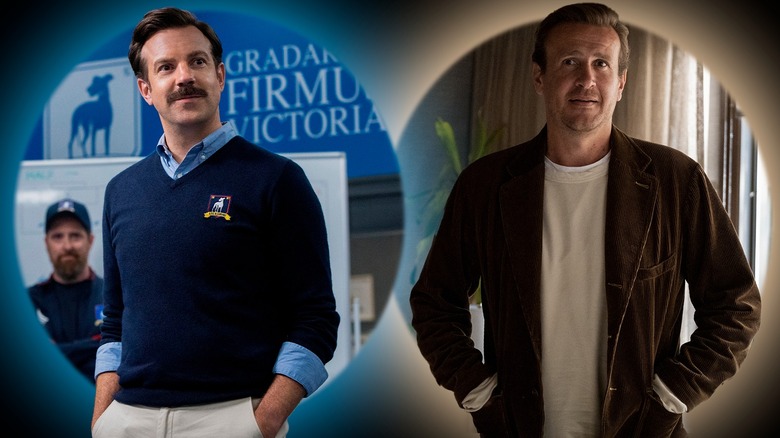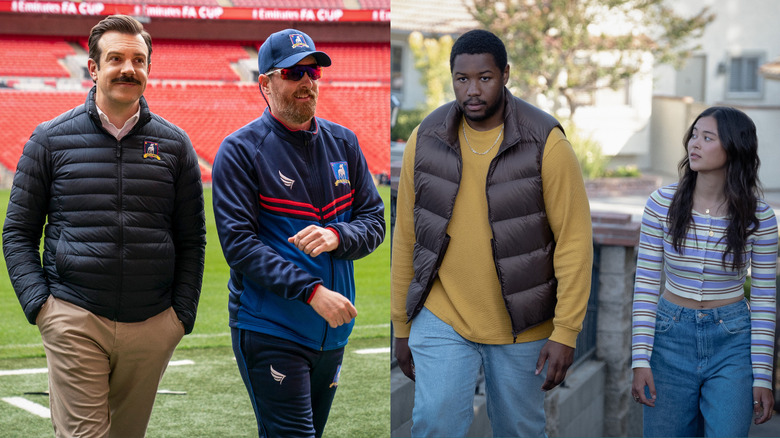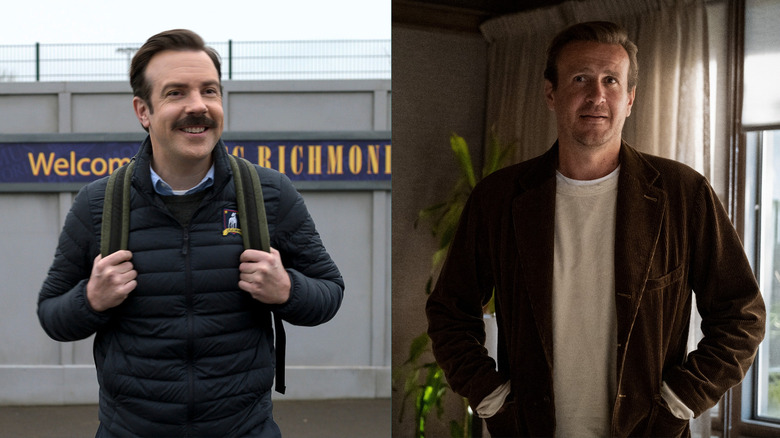Ted Lasso And Shrinking Are The Double Bill That's Mainstreaming Men's Mental Health
Very soon, the final whistle will blow on Ted Lasso's term (or so we're guessing) as the manager of AFC Richmond. Understandably, this will have some fans struggle to find a substitute to fill in that big chunk of their television heart where a certain mustache used to reside.
Really, though? They don't need to look that far. Heck, they don't even need to change the station. Because as the stadium lights at Richmond get flipped, elsewhere, a therapist is having a lightbulb moment of his own on another Apple TV+ show from two of the "Ted Lasso" crew's most extraordinary talents. "Shrinking," (now greenlit for a second season), follows a grieving widow and therapist, Jimmy (Jason Segel), who decides on a new unorthodox approach with his patients, to help them and also help himself steady his ship (and the family and friends within it). Segel co-created the show alongside "Ted Lasso" big brain, Bill Lawrence and the owner of that iconic and mysterious Roy Kent growl, Brett Goldstein. Along with a collection of talent as warm and welcoming as their three-season soccer show, there's also the added oomph of a man that could out grumble even Kent himself — Harrison Ford.
What binds these two shows, other than the creative force behind them, is a new male character model that's central to the success of both narratives — and that is a male figure who is not just open about his own mental health, but also confident enough to pull back on cracking jokes when someone else needs to be heard.
Ted Lasso and Shrinking give a healthy way to look at men's mental health in comedy television
The depiction of men's mental health (and self-care) in television hasn't been great, historically. To think of men addressing their emotions or past trauma is to see the likes of Bruce Willis on "Friends" get dumped for oversharing by Rachel (Jennifer Aniston), or Nick from "New Girl" being a closed book who can't process good gestures from friends ("you gave me cookie, got you cookie"). Even "Fraser," a show about a therapist, often sets up his patients as the punchline.
"Ted Lasso," on the other hand, has provided the essential action to remedy that. The second season of the football series made a strong effort to focus on the topic, but the first season had already set it up by reworking an old television formula in a better and more relatable way. Speaking to US Weekly, the man behind the manager, Jason Sudeikis, admitted that it had been there from the beginning. "It's been there forever," he explained, "but it's really come up a lot in just knowing where the characters were headed and how important it is to work on yourself to work on yourself to help your team and I think that we were trying to explore that and personify it in a way and kind of trojan horse that there's bigger issues in this fun, silly little comedy show."
Sitcoms have laughed off men's mental health for years, but "Ted Lasso" tweaks the tropes, by showing that these things matter, and allowing other characters to hear them out.
Ted Lasso proves that men's problem-solving can be a team effort
In the Season 1 finale, Jason Sudekis' caterpillar-lipped leader of AFC Richmond tries to provide a silver lining in defeat. "I want you to be grateful that you're going through this sad moment with all these other folks," he explains. "Because I promise you, there is something worse out there than being sad, and that is being alone and being sad." This is a promise that the show sticks to in its second year. It demonstrates that unlike comedy shows prior, laugh track or not, male characters do not have to solve their problems with a simple one-to-one, much less an intentionally awkward hug that ends with them being comically masculine. Instead, mental health can be addressed as a group, treated with respect ... and above all, sometimes, a person's deeper problems, frustration, or loneliness won't be solved in five minutes, and that's okay.
Besides the team getting professional therapy with Dr. Fieldstone (Sarah Niles), there's also the crucial addition of the Diamond Dogs — an unofficial club within the club, containing Ted, Coach Beard (Brendan Hunt), Higgins (Jeremy Swift), and Nate (Nick Mohammed) before the addition of Roy, who isn't there to solve personal problems but just put them out there. To quote Kent, sometimes the Diamond Dogs are "just chatting about s***, and no one has to f****** solve anything, and nothing f****** changes." It is a revelation for a show handling such an important topic, and one applied even more assertively in Goldstein and Lawrence's other joint effort (particularly with the added Han Solo).
Ted Lasso walked the walk so Shrinking could talk the talk
Thanks to Richmond's finest being able to address their problems — whether in Dr. Fieldstone's office or at Diamond Dog emergency meeting — the efforts of "Ted Lasso" to make men feel comfortable to speak openly has set up "Shrinking" for an easy goal. "Shrinking" once again contains refreshing depictions of men dealing with things they're scared to talk about as a group, in a way that — while sharing that familiar heartwarming humor — is far more in-depth.
A standout moment displaying this is between Jimmy, his patient, Sean (Luke Tennie), and his stubborn sage of a colleague Paul Rhoades (Harrison Ford). Sean is a former soldier suffering from anger issues who talks it out with Ford's more seasoned doctor, leaving his young protege to stand on the sidelines to the conversation. It's a brilliant sequence. A Diamond Dog get together in another time zone, one could say, as guys come together and accept that whatever needs addressing won't be immediate or even fixable, but being there — just to listen, and only listen — truly helps.
Here's hoping that however the game plays out with "Ted Lasso," there might be more shows like "Shrinking" that follow suit and ensure that the matter of men talking openly about their issues is heard and not filled with a gag or canned laughter. In the end, like in real life and as prescribed by the good Dr. Rhoades, "Sometimes it's okay if you don't chime in."



